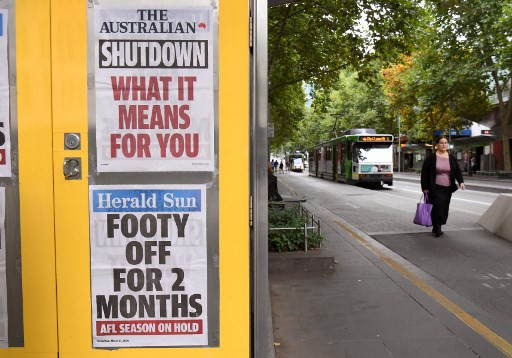Popular Reads
Top Results
Can't find what you're looking for?
View all search resultsPopular Reads
Top Results
Can't find what you're looking for?
View all search resultsTop economists warn about 'collapse' of public interest media
The group of 11 economists in leading American and European universities published a joint statement via the "Forum on Information and Democracy", a body formed by the Reporters Without Borders media freedom group and the French state.
Change text size
Gift Premium Articles
to Anyone
 Newspaper headlines are pasted to the side of a newspaper stand in Melbourne on March 23, 2020.Rupert Murdoch's Australian flagship media group News Corp announced Wednesday it will stop printing around 60 regional newspapers, as the troubled sector received a fresh blow from a COVID-19 advertising downturn. (AFP/William West)
Newspaper headlines are pasted to the side of a newspaper stand in Melbourne on March 23, 2020.Rupert Murdoch's Australian flagship media group News Corp announced Wednesday it will stop printing around 60 regional newspapers, as the troubled sector received a fresh blow from a COVID-19 advertising downturn. (AFP/William West)
A
group of leading economists including Nobel winners Joseph Stiglitz and Daron Acemoglu warned Monday about the "collapse" of the public interest media sector and called on governments to help quality journalism survive.
The group of 11 economists in leading American and European universities published a joint statement via the "Forum on Information and Democracy", a body formed by the Reporters Without Borders media freedom group and the French state.
After detailing the problems stemming from job losses, falling revenues and the AI threat to journalism, the economists urged governments to play a larger role in "investing in and shaping the media ecosystem."
"Governments around the world are chasing the AI dream, pinning their hopes on these technologies to drive economic prosperity," they wrote. "Yet they are not investing sufficiently in a foundational resource that underpins our 21st century economies -- independent, verifiable information."
Media companies have seen their traditional model of selling advertising to fund their news gathering operations decimated since the advent of the internet.
Online platforms such as Meta and Google captured the bulk of online advertising revenues, while new AI chatbots such as ChatGPT or Google's Gemini have dramatically reduced the number of people accessing media company websites for information.
"The informational good that public interest media provide is being captured for private profits by these companies," the economists said.
Societies needed a "collective reappraisal of the social and economic value" of reliable information, which should lead governments to subsidise public interest media and pass legislation to protect them.
Government action was needed to "save us from continuing on a path where public interest journalism looks set to collapse, with enormous consequences for our economy, our society, and our democracies", they concluded.









